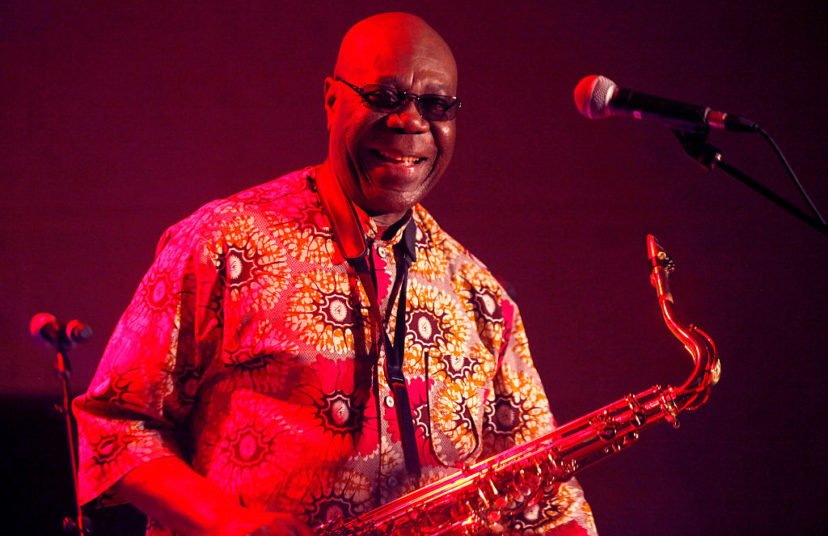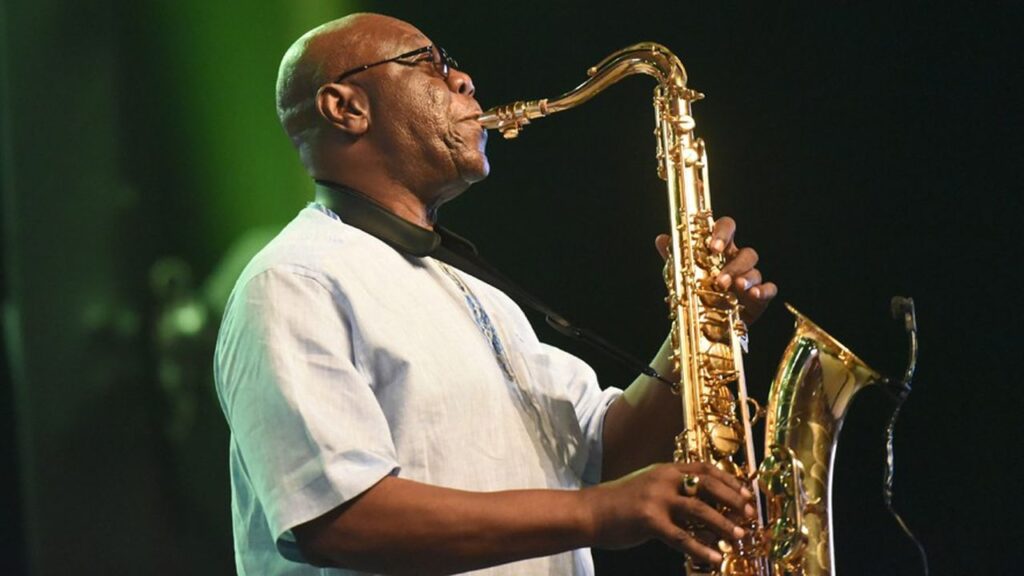
Emmanuel N’Djoké “Manu” Dibango (December 12, 1933 – March 24, 2020) was a Cameroonian musician and songwriter who played saxophone and vibraphone. He developed a musical style fusing jazz, funk, and traditional Cameroonian music. He was best known for his 1972 single “Soul Makossa.”
Manu Dibango was born in Douala, Cameroon. His father, Michel Manfred N’Djoké Dibango, was a civil servant, and his mother a fashion designer, running her own small business. Both her ethnic group, the Duala, and his, the Yabassi, viewed this union of different ethnic groups with some disdain. In Cameroon, your ethnicity is dictated by your father’s, though Manu Dibango wrote in his autobiography, “Three Kilos of Coffee”, that he had “never been able to identify completely with either of his parents.”
Manu Dibango’s uncle was the leader of his extended family. Upon his death, Dibango’s father refused to take over, as he never fully initiated his son into the Yabassi’s customs. Throughout his childhood, Dibango slowly forgot the Yabassi language in favour of the Duala. However, his family did live in the Yabassi encampment on the Yabassi plateau, close to the Wouri River in central Douala. While a child, Dibango attended Protestant church every night for religious education, and enjoyed studying music there, and reportedly was a fast learner.
In 1941, after being educated at his village school, Dibango was accepted into a colonial school, near his home, where he learned French. He admired the teacher, whom he described as “an extraordinary draftsman and painter.” In 1944, French president Charles de Gaulle chose this school to perform the welcoming ceremonies upon his arrival in Cameroon.

He was a member of the seminal Congolese rumba group, African Jazz, and has collaborated with many other musicians, including Fania All Stars, Fela Kuti, Herbie Hancock, Bill Laswell, Bernie Worrell, Ladysmith Black Mambazo, King Sunny Adé, Don Cherry, and Sly and Robbie. He achieved a considerable following in the UK with a disco hit called “Big Blow”, originally released in 1976 and re-mixed as a 12″ single in 1978 on Island Records. In 1998, he recorded the album CubAfrica with Cuban artist Eliades Ochoa.
In 1974, he was nominated at the 16th Annual Grammy Awards in the categories Best R&B Instrumental Performance and Best Instrumental Composition for “Soul Makossa”.
The song “Soul Makossa” on the record of the same name contains the lyrics “makossa”, which means “(I) dance” in his native tongue, the Cameroonian language Duala. It has influenced popular music hits, including Kool and the Gang’s “Jungle Boogie”. The 1982 parody song “Boogie in your butt” by comedian Eddie Murphy uses Soul Makossa’s bassline and horn charts while “Butt Naked Booty Bless” by 1990s hip-hop group Poor Righteous Teachers heavily samples its musical bridge and drum patterns.
Manu Dibango served as the first chairman of the Cameroon Music Corporation, with a high profile in disputes about artists’ royalties and was appointed a UNESCO Artist for Peace in 2004.
His song, “Reggae Makossa”, is featured on the soundtrack to the 2006 video game Scarface: The World Is Yours. In August 2009, he played the closing concert at the revived Brecon Jazz Festival. in the UK.
In 2009 he filed a lawsuit claiming that Rihanna’s “Don’t Stop the Music” and Michael Jackson‘s “Wanna Be Startin’ Somethin'” used the “Mama-say, mama-sa, ma-ma-ko-ssa” hook without his permission. According to Manu Dibango, the line is from his 1972 single “Soul Makossa”. Agence France-Presse reported that Michael Jackson admitted that he borrowed the line for “Wanna Be Startin’ Somethin'” and settled out of court. When Rihanna asked Jackson in 2007 for permission to sample the line, he allegedly approved the request without contacting Dibango beforehand.
Dibango’s attorneys brought the case before a court in Paris, demanding €500,000 in damages and asking for Sony BMG, EMI and Warner Music to be “barred from receiving ‘mama-say mama-sa’-related income until the matter is resolved”. The judge ruled that Dibango’s claim was inadmissible: a year earlier, a different Paris-area judge had required Universal Music to include Dibango’s name in the liner notes of future French releases of “Don’t Stop the Music”, and, at the time of this earlier court appearance, Dibango had withdrawn legal action, thereby waiving his right to seek further damages.
On September 8, 2015, Michaëlle Jean, Secretary General of the Organisation Internationale de la Francophonie, honored Manu Dibango with the title of Grand Témoin de la Francophonie aux Jeux Olympiques et Paralympiques de Rio 2016 (Special Representative of Francophonia to the Rio 2016 Olympic and Paralympic Games).
Manu Dibango died on March 24, 2020 of COVID-19, aged 86.
Check out Manu Dibango on Amazon.
If you liked this article please share it with your friends and family, and why not check out some more Musicians who died in 2020.
.


Pingback: Musicians taken by Coronavirus (COVID-19) | Dead Musicians